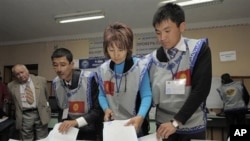Kyrgyzstan's government held a democratic election - and then lost it. That is the assessment in Bishkek, the Kyrgyz capital.
Defying pre-election polls, a virulently nationalist party, Ata-Zhurt, or Fatherland, emerged as the top vote getter among the five parties that will seat representatives in Kyrgyzstan's new parliament.
Next month, under a new constitution, Kyrgyzstan is to become Central Asia's first parliamentary democracy. But Fatherland, and a pro-Russia party that did surprisingly well, Ar-Namys, campaigned for taking the nation back to a presidential system.
That is the murky picture that emerged after the nation's two pro-government parties, the Social Democrats and Ata Meken, performed surprisingly poorly.
As politicians start bargaining to forge a ruling coalition, the kingmaker role may be played by Respublika, a new force. The party's founder, Omurbek Babanov, a businessman, met last month with Russian Prime Minister Vladimir Putin.
How the election went
With the shape of Kyrgyzstan's government expected to be a work in progress for weeks, authorities preferred to talk about the conduct of Sunday's voting.
Interim President Roza Otunbayeva posted a video message on her website that hailed the election.
She said, across this mountainous land Kyrgyz people "without pressure, without dictates, without any kind of run-around or machination, voted for those parties which they consider to be the strongest."
Breaking with the region's political tradition of rigged elections, Kyrgyzstan, she said, held "free, democratic and open elections".
This assessment was largely shared by an election monitoring group from the Organization for Security and Cooperation in Europe.
"Fundamental freedoms, including the right of assembly, association, and expression, were generally respected," Norwegian parliamentarian, Martin Hoglund, who led the group, said. "I have observed a number of elections in Central Asia over the past years. I must say, this is election in Central Asia that I have been to, where I could not predict the outcome. And I believe this election reflected the will of the people of the Kyrgyz Republic.''
The observer group, part of about 500 foreign monitors who fanned out across the nation on Sunday, said voting was hampered by outdated voting lists. The observers also cited the inability of some Uzbeks to vote in southern Kyrgyzstan because they had lost their documents in ethnic violence last June.
Vote manipulation?
About 57 percent of voters turned out across the nation. Surprisingly, Osh, the center of last summer's ethnic violence, reported the nation's highest turnout at 66 percent.
One American poll watcher in Osh, who asked not to be named, said that authorities there manipulated voting to favor the nationalist Fatherland Party. He said it was odd that in one Uzbek majority district, the votes went heavily to the Fatherland Party, a group whose leader has said Uzbeks should never enjoy equal rights with Kyrgyz.
With 95 percent of the vote counted, the only area with incomplete results was a heavily Uzbek area in the south.
Despite the irregularities, the election took place without violence. And it appears the results will be largely accepted without violence.
Most political leaders are now behind closed doors, having shifted their energies to negotiating a ruling coalition in the 120-member parliament that is to meet in November.
Krygyzstan Parties Start Coalition Talks for Parliamentary Democracy
- By James Brooke




